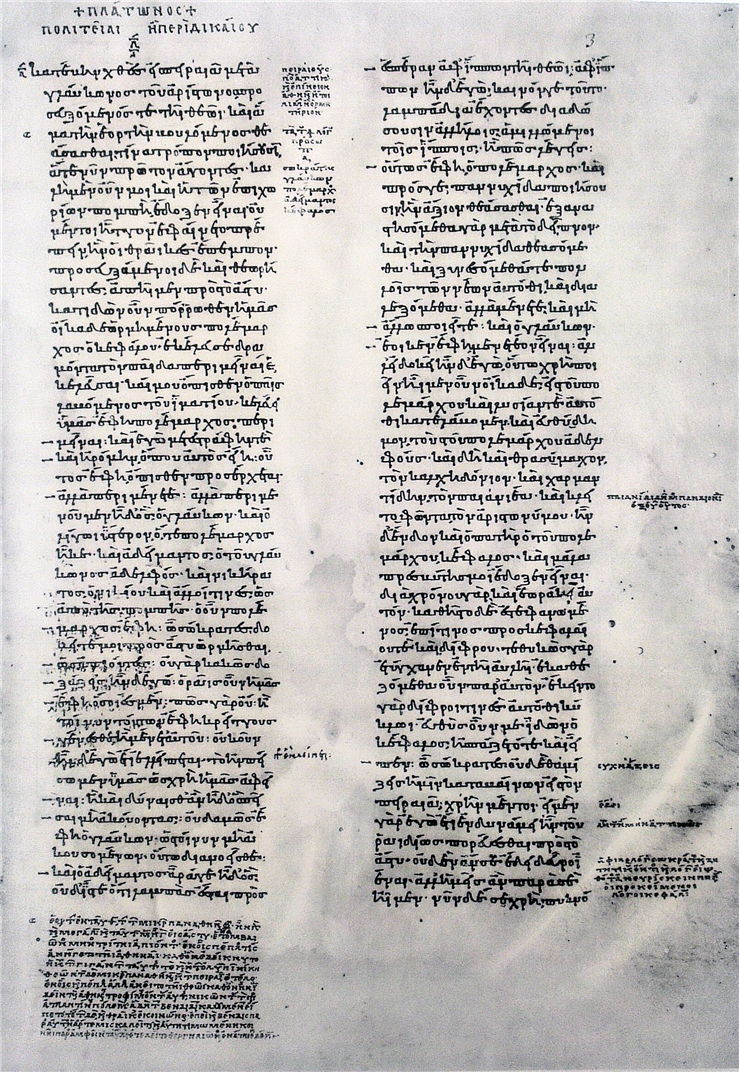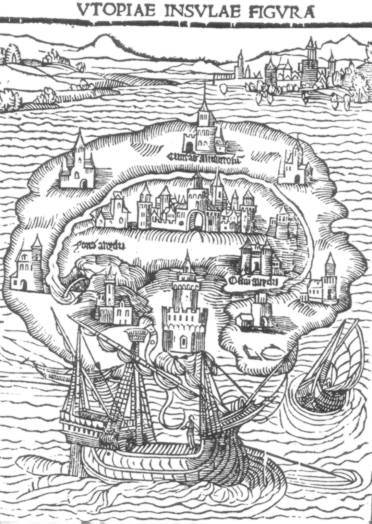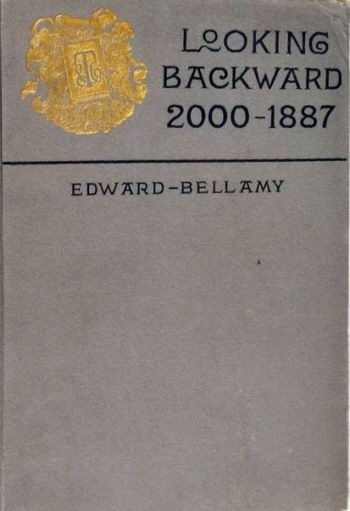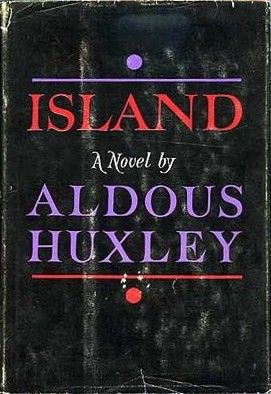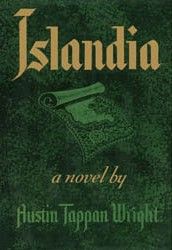List of Utopian Literature - Famous Utopian Works
Pre-20th century
- The Republic (~380 BCE) by Plato, represents one of the first written concepts of the utopia. In it he proposed the necessary steps for the creation of the perfect Greek city-state, where citizens will be separated in specific classes and rules who would provide everything to them (security, resources, laws).
- The City of God (413-426 AD) by Augustine of Hippo, described the ideal utopian society of "eternal" Jerusalem. He proposed that Christian believers should not be concerned with earthly politics, but instead focus their beliefs to the mystical, heavenly city of "New Jerusalem".
- Tao Hua Yuan (421) is a poem by Tao Yuanming, described the ethereal utopia of Chinese intellectual class, where people lived perfect lives, freed from diastases, death, and in perfect harmony with nature. It spawned several similar beliefs, myths and literary works in China.
- Al-Madina al-Fadilaby Al-Farabi (874-950) described another attempt in making perfect religious utopian state. He described the order that was made in city-state of Medina, under the rule of the prophet Mohamed who received his orders directly from Allah.
- Utopia (1516) by Thomas More, was a fictional book that brought the name of "utopia" to the western world. In it, Moore proposed religious toleration, freedom of marriage, and simple communal life, free education, health care, and harsh punishments for criminals (slavery, euthanasia, banishment, and food deprivation).
- Christianopolis (1619) by Johann Valentin Andreae, proposed an ideal Christian utopia which was governed by the democratic community of scholars and artisans.
- The City of the Sun (1623) by Italian philosopher Tommaso Campanella described the utopia in which goods, women and children had the same status as men. In his book, he prophesied that Spanish line of Kings was destined to bring this "divine plan" to the entire world.
- New Atlantis (1627) by Francis Bacon described futuristic utopia that revolved around the notions of "generosity and enlightenment, dignity and splendour, piety and public spirit". He proposed creation of ideal teaching schools called "Salomon's House", which was basis for the creation of modern universities.
- Erewhon (1872) by Samuel Butler is a novel that describes the adventure of the protagonist, who discovered secret utopian settlement in the mountains of New Zealand. In this settlement called "Erewhon", people live without the help of machines and have different attitude toward criminals - criminals are regarded as if they are ill, but ill people are treated as criminals.
- News from Nowhere (1892) by William Morris, describes utopian place called "Nowhere" where there is no politics, and society lives under the common ownership of goods and perfect democratic control.
- Looking Backward (1888) by Edward Bellamy, is a novel that describes the life in the perfect socialists utopia. Upon its release, book became instant bestseller and was very influential in the works of many future novelist and philosophers.
- Gloriana , or the Revolution of 1900 (1890) by Lady Florence Dixie, describes adventure of female protagonists who while posing as a man managed to enable the right of women to vote, which created better life for all the citizens of Great Britain.
20th century
- A Modern Utopia (1905) by H. G. Wells, describes futuristic world state in which every country of the world has merged into one, and every person has achieved perfect happiness. In addition, he proposed giving equal rights for women and men, with even giving more rights to women that are pregnant.
- Islandia (1942), by Austin Tappan Wright described imaginary, secluded utopian island in the Southern Hemisphere. Folowing the influence of Archadian elements (balance of human existence with nature) this utopian community closely guarded their existence from the outside world and rejected any notions of industrialism.
- Walden Two (1948) by B. F. Skinner, depicts a small self-sufficient utopian community that was made as an experimental trial in making perfect human environment. Every aspect of human life was put to rigorous scientific testing. Many real world communities tried to emulate the ideas formulated in this novel.
- Childhood's End (1954) by Arthur C. Clarke, depicts rise of the human civilization to the utopian state after the arrival of benevolent alien race. During the several generations, they provided us with advanced technologies that ended all wars, streamlined our economy, created unified world government and provided better life for every person on earth.
- Big Planet (1957), by Jack Vance, describes the world after the destruction of several utopian civilizations. The only surviving city was Kirstendale, where citizens constantly shifted their jobs and status ranks (from worker to aristocrats, and back again), according to cities elaborate schedule.
- Island (1962) by Aldous Huxley, describes the adventure of cynical journalist Will Farnaby, who survives shipwreck and find himself stranded on a secluded utopian island of Pala. There he explores the local civilization, which has managed to create utopian society.
- The Lathe of Heaven (1971), by Ursula K. Le Guin, describes the events of one psychologist who has found the way to change reality. In an attempt to create better society, he soon found out that every of his changes brought many disastrous unintended consequences.
- The Dispossessed (1974), by Ursula K. Le Guin, describes the life of two fictional civilizations that lived on two neighboring planets. One of those worlds practiced capitalist and materialistic lifestyle of 20th century US, the other used more utopian system in which all the gods and resources were free for consumption to all of its citizens.
- Ecotopia : The Notebooks and Reports of William Weston (1975) by Ernest Callenbach, depicts the ecological utopian society that was created after the secession of the Pacific Northwest from the United States. As one of the first modern description of ecological utopia, this novel represented great influence in the creation of many political "green" movements of the 1970s.
- Woman on the Edge of Time (1976) by Marge Piercy, describes the life of a Hispanic woman who has visions of the futuristic utopian society. Novel describes the differences between harsh present reality and utopian future, in which there is no environmental pollution, homophobia, racism, class-subordination, consumerism, imperialism, and totalitarianism.
- The Probability Broach (1980) by L. Neil Smith, describes two views (one utopian and one dystopian) on the present-day north America based on the alternative outcomes of the American War for Independence.
- Always Coming Home (1985), by Ursula K. Le Guin, depicts the futuristic ecological society that lived in the present day California. This civilization did not have governments, aristocrats, belief in supernatural and human domination of the natural environment.
- The Fifth Sacred Thing (1993), by Starhawk, is a post-apocalyptic novel that describes two different societies - one that is totalitarian, militaristic theocracy and other that that is based on social justice and sustainable economy.
